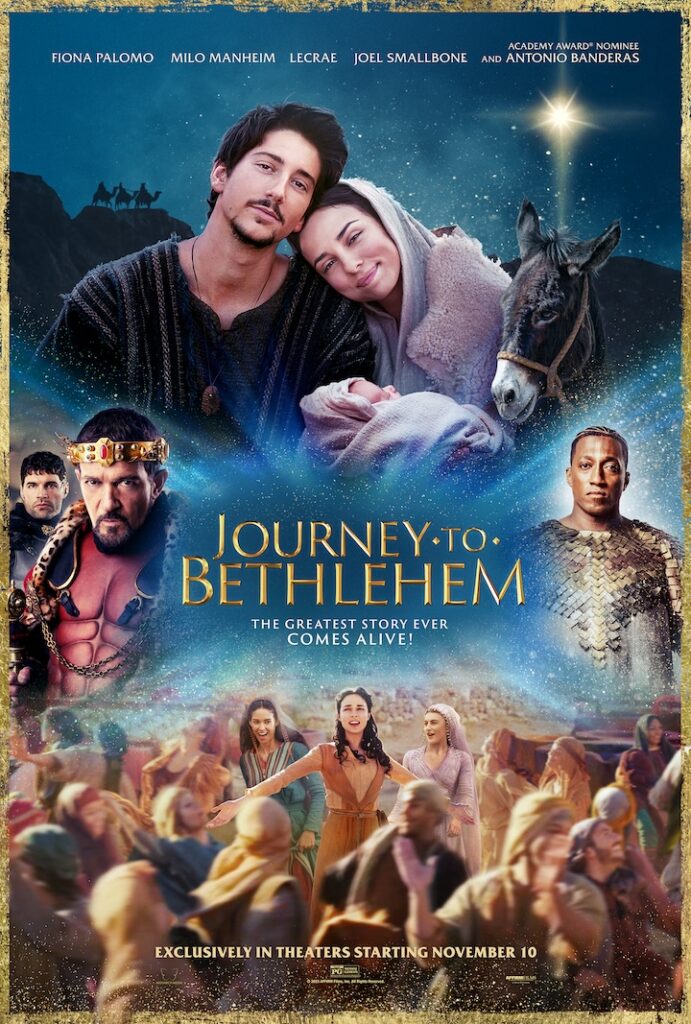Director Adam Anders has made Journey to Bethlehem, a singing-and-dancing version of the Infancy Narrative in Luke’s Gospel, that seems like a remake of Disney’s Aladdin, although less like the 1992 animated version, in which the genie was exuberantly voiced by Robin Williams, and more like the 2019 live-action version with Will Smith as a joyless jinni.
Journey to Bethlehem is a wholly non-sectarian re-telling of events culminating in the Incarnation of Jesus Christ, and it includes some questionable interpolations about how that all went down. Of course, every film about the birth of our Lord has taken poetic license. In fact, as the end credits roll, we read: “While taking some creative license, the filmmakers strive to remain true to the message of the greatest story ever told.”
Mr. Anders, the Swedish music producer behind the TV series Glee, wrote Journey to Bethlehem with Peter Barsocchini, whose most famous credits are (speaking of Disney) the three very popular High School Musical films. Anders’ wife, Nikki, is lyricist. These good people probably have the pulse of teenagers as well as any filmmakers do.
But Alan Menken, Howard Ashman, and Tim Rice wrote more interesting music and lyrics for Aladdin (as did Mr. Rice with Andrew Lloyd Webber for Jesus Christ Superstar).
The story begins, in Shakespearean style, with the prattle of fools – in this case the three magi. Balthazar has seen the star through his (anachronistic) telescope (the first was invented in the 17th century), and he shows Gaspar. Together they run to tell Melchior, who thinks about nothing but food. But he knows where they need to go: Judah.
“Are you certain?” Balthazar asks. “Those are King Herod’s lands.”
“You, don’t insult me!” Melchior says sharply to Balthazar and then to Gaspar, “You, get me a kebab!”
Cut to: The three wise guys on camels crossing a desert which becomes a map.
Cut to: Nazareth, where we meet Mary, a girl with “crazy ideas” – her father says – including her dream of becoming a Bible teacher. No, her father says, she must marry a nice young boy from Bethlehem. “This is your fate.”
Mary storms out of the house, followed by her sisters, Rebekah and Deborah, who dance and sing: “Mary’s Getting Married.”
In Nazareth’s marketplace, she bumps into a strange young man. It’s a forceful first encounter, but no one is hurt. The young woman and the young man make sarcastic small talk, but don’t introduce themselves.
Cut to: King Herod, preening before a mirror. His son, Antipater, has returned from Rome to announce that Caesar Augustus has decreed a census.
This was the first time I’ve heard Antonio Banderas (as the king) sing since he played Che Guevara to Madonna’s Evita. In a song Mel Brooks might have sung in History of the World, Part I, had that been a musical, Banderas snarls, “It’s Good to Be King.”
Yet, surely, even Mr. Brooks wouldn’t have written lyrics for Herod that end, “Mine is the kingdom, mine is the power, and mine is the glory, forever more.”
Cut to: The Betrothal. That aforementioned scene in the market, when Mary bumps into, you guessed it, Joseph sets up the teen-movie trope in which the girl meets her blind date, sees it’s the kid from an earlier oil-and-water scene, and with deadpan expression sneers, “You . . .”
Mary flees but Joseph follows and there ensues the kind of sitcom-feminist banter that counterpoints her steady, older-than-her-years intelligence with his dopey teenage clumsiness. When Mary admits her ambition to be a teacher, Joseph reveals his dream: to be an inventor. Never a mention of carpentry in the film.
Cut to: Mary’s bedroom. Gabriel appears. Nice looking angel, yet he makes a poor impression. This is the moment we all know from Luke 1:28: “Hail, full of grace, the Lord is with thee: blessed art thou among women.” But our movie Gabriel is nervous. So – as they say in the movie biz – he has to run his lines. Can’t make up his mind how to convince her of God’s good news.
Finally, inspired, he grows bigger, bolder. Like the genie in Aladdin. Then he disappears: Poof! Like the genie in Aladdin.
Cut to: The Visitation, which is kind of, Hey, Mary, good to see you! No Magnificat; no infant John leaping for joy in Elizabeth’s womb at the sound of Mary’s greeting. (Luke 1:41–45)
Cut to: Joseph, back in Bethlehem, having it out with himself – an actual brawl between a Joseph in black and a Joseph in white. And they sing, “The Ultimate Deception,” which is, you know, St. Joseph’s dream.
Interesting that the man who never says a word in Scripture has so much to say (and sing about) here. Creative license.
Cut to: Herod having bad dreams too, until the Magi arrive to sing him to sleep with the song, “Three Wise Guys.” They dance a little while singing the final chorus of . . . Handel’s Messiah.
Cut to: Zechariah’s house into which Joseph has sneaked to warn Mary to hide from Herod’s soldiers, who are led by Antipater, wearing a golden ear decoration, a leaf-like arrangement with a concha inset meant to resemble a wireless headset.
Cut to: Zechariah marrying Mary and Joseph in an impromptu ceremony. The spouses sing “We become We.”
Cut to: Antipater asking the Magi what the Child they’re seeking could possibly give to the restless Herod that he doesn’t already have. Melchior replies, “Well, how about, I don’t know, a good night’s sleep!”
Well, we all want that.
At what point does “taking some creative license” cross over into sacrilege? I’m unsure. I think Journey to Bethlehem comes close without doing so. Harmless fluff? Maybe. But keep in mind that the audience for the movie is kids – same as for Aladdin.
And here’s the thing: when a precocious kid says, “I didn’t know that Zechariah married Joseph and Mary,” you may smile weakly. But you’ll probably gnash your teeth when the child says, “Wow! I never knew Antipater came to the manger and guaranteed safe passage to Egypt for the Holy Family!”
As Antony says to the crowd in Julius Caesar: “This was the most unkindest cut of all.”
Note: Journey to Bethlehem is rated PG. In addition to Mr. Banderas, the film stars Fiona Palomo (Mary), Milo Manheim (Joseph), and Joel Smallbone (Antipater), and Lecrae (Gabriel).


















